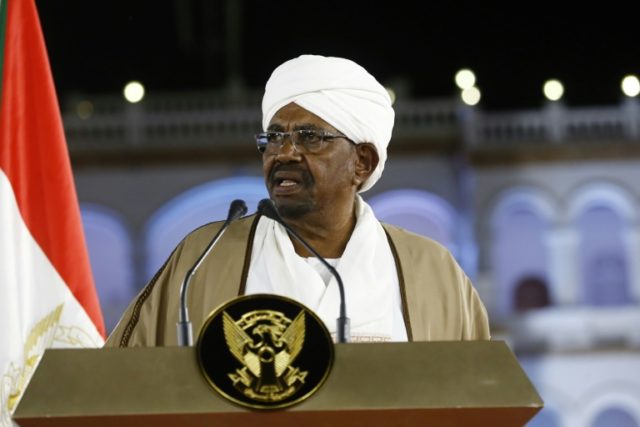According to an Egyptian media report, Sudanese President Omar al-Bashir is considering his resignation as protesters emboldened by the ouster of the Algerian president grow more confident and the military begins intervening to protect demonstrators from Bashir’s security forces.
Egypt’s Ahram Online reported on Monday that Bashir will step down “soon” because “it has become clear that the army has picked its side.” Ahram Online’s sources said the only reason Bashir is still in office is that factions of the Sudanese military disagree about who should replace him.
“The council is currently looking for someone with a military background, respected by middle- and high-ranking officers, and with no political affiliations. Someone not wanted by the International Criminal Court,” one source said.
The sense that the military has chosen a side grew after army troops intervened to protect demonstrators outside the Defense Ministry from an assault by security forces. Activists circulated video clips of the army stepping in while jubilant demonstrators chanted, “One people, one army.” Some eyewitnesses heard gunshots and reported soldiers opening fire on agents of Bashir’s National Intelligence and Security Service (NISS).
On Tuesday, the Sudanese police “ordered all forces” not to “intervene against the citizens or peaceful rallies.” The police statement included a prayer for a “peaceful transition of power.”
According to the Sudanese Interior Ministry, seven protesters have been killed and dozens injured so far, along with 42 injuries among security forces. Outside monitoring groups say the death toll is much higher, with estimates of 20 to 40 deaths and hundreds of injuries. Protesters say the NISS deployed tear gas and fired on them with live ammunition before the military stepped in.
“It is pointless for Omar al-Bashir to continue using his thugs to get us off the streets as we are not going anywhere,” one protester defiantly told the BBC.
Bashir has been in power since 1989 and under United States sanctions for the past twenty years due to human rights abuses. The International Criminal Court (ICC) indicted him for genocide and crimes against humanity in 2009 and issued warrants for his arrest in 2003 but, to the great consternation of the ICC, he has traveled with impunity to destinations ranging from China to Saudi Arabia to Egypt.
Some countries Bashir has visited, including South Africa and Jordan, are supposed to be full parties to the ICC treaty, so their refusal to enforce the warrants led critics to question the usefulness of the court.
Bashir seemed on the verge of stepping down in February. Instead, he sacked nearly the entire national government and declared a state of emergency to last the entirety of 2019. The ensuing protests were given a jolt of fresh energy and optimism when similar public pressure forced Abdelaziz Bouteflika, the equally ancient president of Algeria, to resign last week.
The United States, United Kingdom, and Norway issued a joint statement on Tuesday calling for a “transition to a political system that is inclusive and has greater legitimacy.”
“We call on the Sudanese authorities to release all political detainees, stop the use of violence against peaceful protestors, remove all restrictions to freedoms, lift the state of emergency, and allow for a credible political dialogue in a conducive environment with all key Sudanese actors that has as its basis the goal of a political and economic transition to a new type of Sudan,” the three countries wrote, holding out the possibility of assistance with “the long-term economic challenges that Sudan faces” if Bashir and his allies comply.
France24 on Tuesday saw the supposedly “coup-proof” Bashir regime facing its most serious challenge in decades, recalling how the fall of Hosni Mubarak in Egypt became inevitable after the military began protecting demonstrators.
“The mobilization has reached a critical mass and this has pushed some soldiers to side with the protesters,” said Sudan expert Jean-Baptiste Gallopin, a Ph.D. candidate at Yale University.
“It doesn’t mean the army has switched sides as an institution. These are still only localized defections, but the situation is very unstable,” Gallopin told France24. “Whether disobedience leads to punishment will be crucial in determining whether other soldiers follow suit and stop obeying orders.”
As to the people giving those orders, Gallopin and other observers noted Sudanese military officers of high rank enjoy many special privileges and tend to side with the regime that pampers them, while rank-and-file soldiers are more inclined to sympathize with the demonstrators, who are outraged at the declining standard of living in Sudan. If Ahram Online’s report is accurate and military commanders are telling Bashir it is time to go, his days might indeed be numbered.

COMMENTS
Please let us know if you're having issues with commenting.